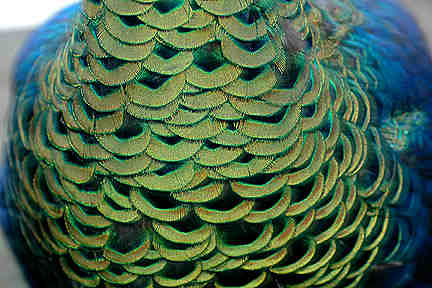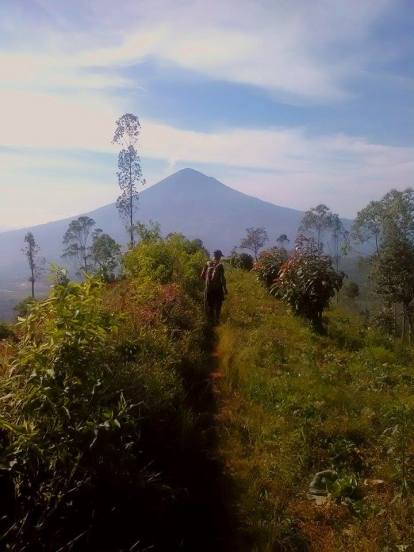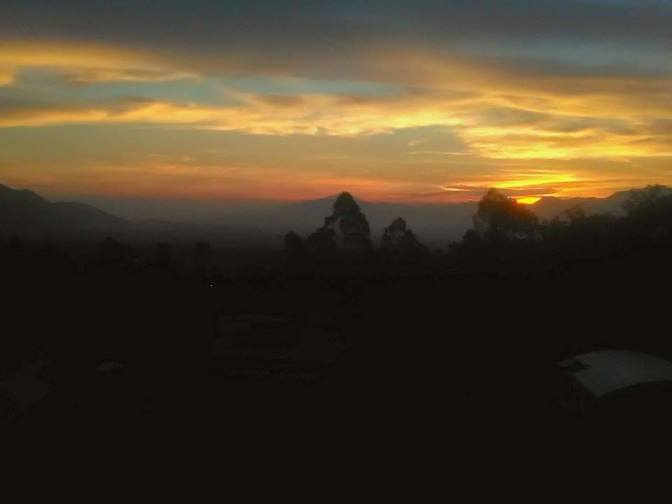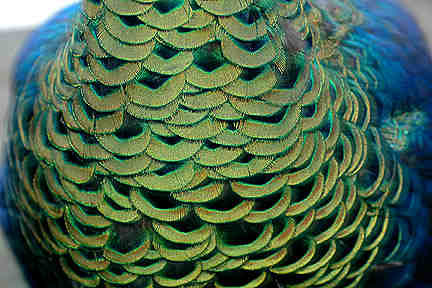
The almost perfectly conical mountain lying across the valley, from behind which the sun is cracking the pre-dawn sky in two, has wild peacocks.
It is 5 am and the tracker points again at the mountain and nods, “peacocks” to reinforce the point. It is fast approaching a month since my arrival in Java and every time I think I gain a foothold in the uncertainty, this place finds a way to throw me. I thought peacocks were only native to India, but I am beginning to accept that this island has many secrets, most of which I will never know.
 Still, I make no attempt to mask my surprise and the tracker smiles broadly at me, entertained by my mix of ignorance and awe. The last time I received a similar jolt of shock was the day after my arrival, when I discovered that the nearly extinct Javan leopard, persecuted out of most of its major range, has been sighted close to the study site. Apparently one or two individuals still live high in the forest that caps the mountain. I have spent several long moments staring hard at it from the balcony of the volunteer house, imagining them lurking beneath the canopy of wispy clouds that cling like shredded cloth to the tree tops.
Still, I make no attempt to mask my surprise and the tracker smiles broadly at me, entertained by my mix of ignorance and awe. The last time I received a similar jolt of shock was the day after my arrival, when I discovered that the nearly extinct Javan leopard, persecuted out of most of its major range, has been sighted close to the study site. Apparently one or two individuals still live high in the forest that caps the mountain. I have spent several long moments staring hard at it from the balcony of the volunteer house, imagining them lurking beneath the canopy of wispy clouds that cling like shredded cloth to the tree tops.
Nothing ever stirs but the breeze pulling at the threads of the clouds and the sun edging steadily across the sky.
I look up the Java peacock later, they are green here instead of the more familiar blue of the Indian peacock that freely wanders the grounds of so many zoos across the world. Green peafowl are also much more aggressive toward intruders.
The peak looming behind us, the one on which one of the eclectic jumble of research volunteers accompanied by a local tracker tirelessly ascend every night, has no name. At least not one I can find through a Google search. It is labelled on the map with the same name as the nearby active volcano, Papadayan, it’s closest neighbour. When Google doesn’t know where you are, you know you have reached the true peripheral wilderness of civilisation. The outlands, the boarder between the rose-tinted halo of society and the chaos of the wilds. I feel this is more a place to belong than I have found in a while. It is beautiful in its violence and contradiction, in it’s unpredictable geology, its volcanic people.
The call to prayer has already echoed around the valley for an hour or more. From this spot, high on the slopes of the nameless mountain, the voices of many mosques meet and victoriously clash together as if at war. The cacophony is almost by design, with an undercurrent of competition raising the volume on every crackling speaker. I can almost hear the tail-end of each verse rise with a question-mark; which mosque has the loudest call, which singer wakes the earliest, which village is the most devout. To me, it is ghostly, like the wailing of another world. Both haunting and godly. It rattles you. I feel both awed by the strange beauty and disturbed to my bones.
Somewhere higher on the mountain, a feral dog howls.
The day begins at 3.30 am for the villagers. We watch as both male and female farmers peacefully traipse up the 1000 meters to their fields and greet us with friendly, wide-eyed smiles as we blearily descend from our nocturnal wanderings on the high slopes. They must think we are crazy, with our big metal antenna for radio-tracking (proven by one unfortunate tracker to double as a lightening rod), our boxy receivers, our charts and grubby clothes and white faces.
I admire them as I look at the empty sacks they carry scrunched up between their fingers and I think of the carrots and green labu that will later fill them to the brim. Some bags will be as large as themselves and half again as wide. They will each carry two, one hanging from each end of a bamboo stick carried across their shoulders, through the height of the midday sun.
We have just completed a shift monitoring the critically endangered Javan Slow Loris, a lemur-like primate that still somehow manages to cling to survival in the uplands of West Java despite severe habitat fragmentation from agricultural practice and poaching for the wildlife pet trade.

It is unsettling to think of these creatures vanishing forever. Every time I close my eyes, it seems like I see those little firefaces, eyes like hot coals burning in the Jiengjen tree, reflecting the red torchlight. I see the cold blanket of stars at midnight sweeping the day from our minds like cobwebs and the mountain glowing at dawn like a beacon guiding us home.
- Sadhbh
- Volunteer

